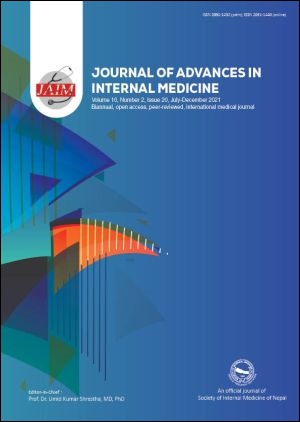Monoclonal Antibody Cocktail therapy for COVID-19: A Pharmacological innovation
DOI:
https://doi.org/10.3126/jaim.v10i2.42200Keywords:
COVID-19 drug treatment, Drug Design, Hybridomas, TherapeuticsAbstract
The novel SARS-CoV-2 infection has ripped through international health systems and protocols causing unprecedented mortality, morbidity and global trade deficits amounting to billions. Various monoclonal antibodies have been proposed for use in the treatment of COVID-19 infections. One such drug is LY-CoV555 which in an ongoing phase two trial study conducted by Chen P et al, showed to have an elimination of 99.97% of the viral RNA. The monoclonal antibody 47D11 discovered by Wang et al, binds to SARS-CoV-2. The 47D11 has been reconfigured into a human IgG1 isotope. It has shown that the 47D11 mAb effectively neutralizes the SARS-COV-2 virus. The stance and development however for the treatment of COVID-19 with monoclonal antibodies has shifted from a monotherapy to a so-called monoclonal antibody “cocktail” therapy.
REGN-COV2 is such a cocktail developed with the use of two monoclonal antibodies REGN10987 and REGN10933 which have subsequently been named Imdevimab and Casirivimab. REGN-COV2 is currently under study in four phase 2 and 3 trial studies. These studies are multicentric in nature and are being conducted to evaluate the drug’s efficacy, dosing and clinical use as compared to the placebo. The mechanism of action of such monoclonal antibodies is related chiefly to the inhibition of the virus’s ability to perform its invasion and multiplication within the human body.
The severity coupled with the sheer novelty of the SARSCoV-2 virus demands the use of newer therapies to both decrease the mortality and morbidity in patients suffering from the infection. The use of a combination of monoclonal antibodies is thereby well established and evident to both decrease the viral infection load, but is also useful in disrupting the virus’s life cycle and thus decreases the replication and viral shedding. It is therefore poignant that a combination of monoclonal antibodies, a “cocktail” therapy is employed so as to attack the virus at its various stages and thus this multifaceted approach may enhance the patient’s prognosis.
Downloads
Downloads
Published
How to Cite
Issue
Section
License
Copyright (c) 2021 Jared Robinson, Indrajit Banerjee

This work is licensed under a Creative Commons Attribution 4.0 International License.
This license enables reusers to distribute, remix, adapt, and build upon the material in any medium or format, so long as attribution is given to the creator.




